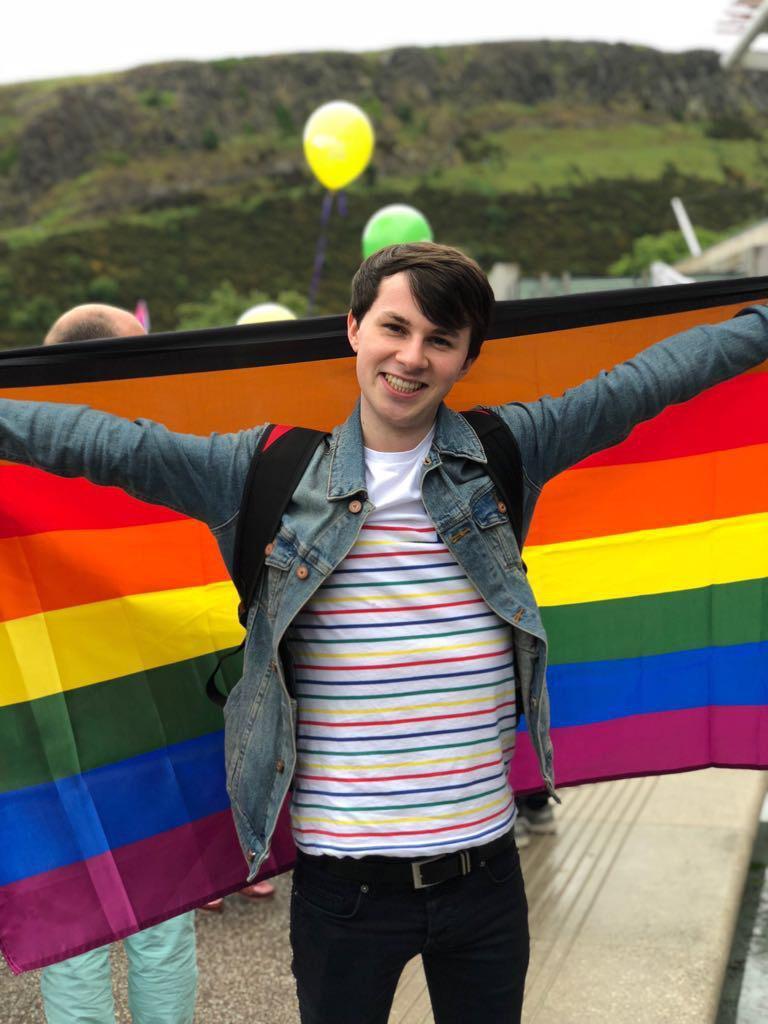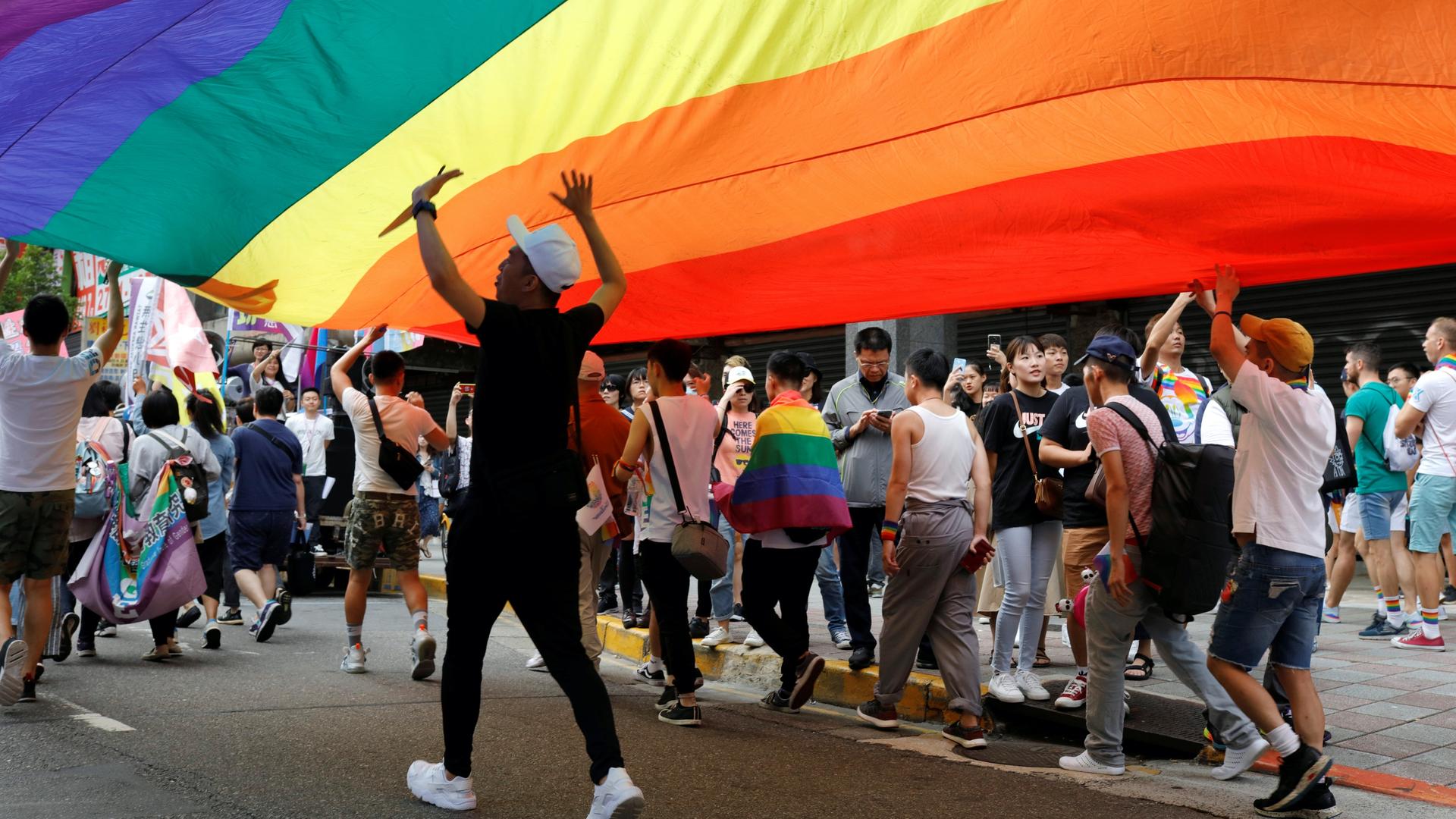Participants march under a giant rainbow flag during the LGBTQ Pride parade in Taipei, Taiwan, Oct. 26, 2019.
Since the first brick was thrown at Stonewall in the summer of 1969, lesbian, gay, bisexual, transgender and queer (LGBTQ) communities around the world have celebrated queerness each June, with protests, parties and day-long parades.
Celebrations this year will look different. According to an open list maintained by the European Pride Organisers Association, nearly 500 Pride events have been canceled or postponed due to the coronavirus pandemic.
Related: South Korea’s coronavirus contact tracing puts LGBTQ community under surveillance
“Oh, my God. The loss is indescribable. … Every Pride organizer will tell you that, at every Pride they’ve ever organized, they can remember somebody who said to them, ‘This is my first time at Pride. This is the first time I’ve felt part of a community. I’ve felt loved. I’ve felt included. I haven’t felt like an outsider.’ And the fact that so many people won’t have that in-person experience this year is really the worst thing about it.”
“Oh, my God. The loss is indescribable,” said Steve Taylor, a board member of the European Pride Organisers Association (EPOA). “Every Pride organizer will tell you that, at every Pride they’ve ever organized, they can remember somebody who said to them, ‘This is my first time at Pride. This is the first time I’ve felt part of a community. I’ve felt loved. I’ve felt included. I haven’t felt like an outsider.’ And the fact that so many people won’t have that in-person experience this year is really the worst thing about it.”
Related: LGBTQ helplines see surge during lockdown
To rectify that loss, Taylor — along with the EPOA and InterPride, an international cohort of Pride organizers — are putting together “Global Pride.” The virtual, 24-hour event will begin on Saturday, June 27, and run through Sunday, June 28. Viewers will see performances by Pabllo Vittar, Olivia Newton-John, the Dixie Chicks, and more, according to a May press release.
No login or payment will be required, according to Taylor; the event is free and available to anyone with Wi-Fi.
“Wherever you are in the world, you’ll be able to see content from Prides in India, in Taiwan, in Australia … right the way across to the West Coast, USA,” Taylor said, adding that the online format could also bring Pride events to people who wouldn’t otherwise have access. “Like [the ones] in Central Africa, which are frequently attacked by police. Or the Prides in India, that cause controversy.”
Related: This activist group is taking on Honduras in first trans femicide case
India’s Prince Manvendra Singh Gohil, the first openly gay prince of India, is one of a handful of world leaders who will also be featured in Global Pride, according to the press release. Carlos Alvarado Quesada, president of Costa Rica, where last week same-sex marriage was legalized — will also speak during the event, along with Prime Minister Erna Solberg of Norway, and Prime Minister Xavier Bettel of Luxembourg.
The event, featuring a line-up of world-renowned artists and change-makers, will take place exclusively on a screen. There will be no marching through the streets in unavoidable waves of rainbow, leaving some LGBTQ community members worried that the “virtual” aspect could push already isolated communities further into obscurity.
“It’s easier to ignore if it is not in a physical public space. … I know on Twitter, at least, there are words that you can block. So you won’t get any tweets that have that word in it. So if people wanted to do that, they could. Whilst if it’s down the street, that’s much harder to avoid.”
“It’s easier to ignore if it is not in a physical public space,” said Kieran Robertson, a 23-year-old who identifies as queer from Edinburgh, Scotland. “I know on Twitter, at least, there are words that you can block. So you won’t get any tweets that have that word in it. So if people wanted to do that, they could. Whilst if it’s down the street, that’s much harder to avoid.”

Uwe Hörner, a board member of CSD Deutschland (Christopher Street Day) stressed the need for LGBTQ visibility.
“Social distancing must not lead to the disappearance of diversity,” he said in a Global Pride press release. “We are happy to demonstrate with ‘Global Pride’ to be part of a large community, and we want to send out a strong sign of solidarity and human rights.”
Global Pride will look similar to modern Pride events in one aspect — corporations will be sponsoring the event. Critics say Pride has become a space for companies to virtue-signal their support for the LGBTQ community.
“I really don’t like companies that are using Pride as a means of marketing,” Robertson said. “Years of protest and suffering is being used to sell people stuff. Which is nasty, in my opinion.”
But Taylor said sponsorship deals are “welcome at Pride” because they keep the event accessible to all.
“Pride isn’t for them. But they are included in Pride,” he said. “If a corporate invests $50,000 in a Pride, that’s $50,000 that a Pride organization doesn’t have to charge the people who attend. So they help to keep Pride free. And for me, that’s the most important thing.”
Some LGBTQ community members say it’s those same corporations that exploit and oppress people of color. Pride is a celebration, but by nature, it’s also a protest. At Toronto Pride in 2016, the city’s Black Lives Matter group staged a sit-in and stopped the parade from proceeding for nearly 30 minutes. They asked for better representation at Pride and a ban on police floats in future parades. Toronto Pride’s executive director signed the list of demands on the spot.
Taylor says activist groups will be a key feature of the virtual Global Pride event.
“We’ll be featuring [activist groups], we’ll be featuring their issues. In some countries, you can still be given the death penalty for being LGBTI. So, it’s absolutely critical that we have a balance between those different issues.”
“We’ll be featuring them, we’ll be featuring their issues. In some countries, you can still be given the death penalty for being LGBTI [lesbian, gay, bisexual, transgender, intersex]. So, it’s absolutely critical that we have a balance between those different issues,” he said.
For queer people who report feeling excluded at Pride, this year’s move online is an opportunity to create their own celebration:
“In my mind it’s like, okay, cool, let them have their own digital space and we’ll make ours,” transgender activist Emmelia Talarico, director of advocacy group No Justice, No Pride, told Vox Media about Global Pride’s virtual event. “And then that way, ours can be way more focused on the different communities and people who really need this, and theirs can be focused on being white and mediocre.”
Robertson said there’s no way to recreate Pride as a live experience.
“I don’t think it’s going to feel the same at all. Because it is so much about being with other people. Sharing the same energy,” he said. “I’m sure [my friends and I] will all get together and play games and listen to queer music.”
